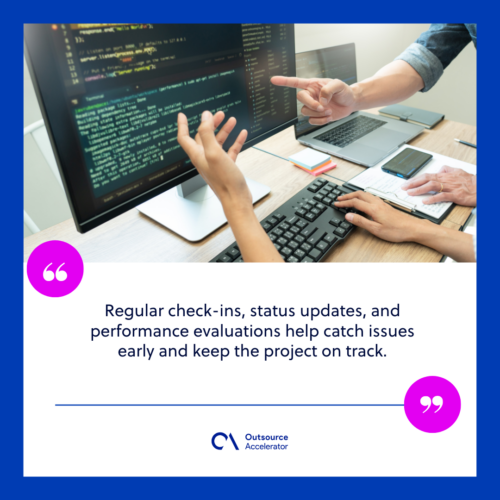6 software development mistakes to avoid when offshoring

Offshoring software development has become a powerful strategy for businesses looking to cut costs and access top talent. According to a 2020 report by Deloitte, 57% of companies cited cost reduction as the primary reason for outsourcing their software development.
Beyond cost savings, farming-out services offer the advantage of tapping into a global pool of skilled developers, often in markets where expertise in specific technologies is more abundant.
It allows companies to scale quickly and focus on core operations while experts handle the technical aspects.
However, despite these advantages, many companies overlook critical mistakes when working with remote teams.
In this article, we’ll explore six common software development mistakes firms must avoid when offshoring to maximize success and get the most out of their partnerships.
How software development mistakes can harm your business
Software development mistakes can have serious consequences for your business, affecting everything from your bottom line to your reputation.
Here’s how these errors can harm your business.
- Increased costs. Mistakes often lead to rework, bug fixes, or project delays, all of which can drive up costs. If software is released with defects or missing features, it can result in expensive fixes down the road.
- Missed deadlines. Without proper project management or clear expectations, development timelines can slip. Delays in software delivery can cause you to miss market opportunities, which can be detrimental in a competitive industry.
- Reduced quality. Skipping key development practices, such as thorough testing or code reviews, can lead to poor software quality. This could result in bugs, system crashes, or security vulnerabilities that damage your company’s reputation and affect customer trust.
- Loss of customer satisfaction. If the final product doesn’t meet customer needs or expectations, it can lead to dissatisfaction. Negative reviews or a drop in user engagement can hurt your business in the long run.
- Lower productivity. Inefficient software or systems that don’t integrate well can slow down internal processes, lowering overall productivity within your business.
These consequences can quickly snowball, making it crucial to avoid common development mistakes.
6 software development mistakes when offshoring
Offshoring software development also comes with its own set of challenges. When companies don’t take the proper steps to manage remote teams, mistakes can occur that negatively impact the project’s success.
Avoid the following software development mistakes when offshoring:
1. Poor communication
Communication fosters successful collaboration, especially when teams are located in different parts of the world. Without frequent and clear communication, misunderstandings can arise.
These misunderstandings can lead to missed deadlines, mismatched expectations, and software that doesn’t align with business goals.
2. Lack of clear requirements
When working with offshore teams, it’s vital to provide detailed, specific requirements. Vague instructions or a lack of documentation can confuse developers, resulting in software that doesn’t meet your needs.
Clear requirements help both parties stay on the same page and move in the right direction.
3. Ignoring time zone differences
When you offshore, you’re frequently collaborating with teams located in different time zones. Failing to account for these differences can lead to delayed feedback and slow progress.
When time zones aren’t managed properly, it can feel like there is a constant lag in communication, which hampers productivity.
4. Overlooking cultural differences
Cultural differences can impact everything from communication styles to work ethics. Failing to acknowledge these differences can result in misunderstandings and inefficiencies.
Taking the time to understand and adapt to cultural nuances can lead to smoother interactions and better collaboration.
5. Not building strong relationships
Remote teams may not have the same sense of connection as in-house teams, which can lead to a lack of trust and cooperation. Building strong relationships with your offshore team fosters better communication, accountability, and a greater sense of ownership over the project.
6. Neglecting ongoing monitoring
It’s important to regularly monitor the progress of offshored projects. Without consistent oversight, issues may go unnoticed until they become significant problems.
Regular check-ins, status updates, and performance evaluations help catch issues early and keep the project on track.
Ensure the success of your software development with Outsourced
For businesses looking to build a successful outsourced IT team, Outsourced offers access to top-tier talent across various technology roles.
Whether you need developers, cybersecurity specialists, or cloud engineers, Outsourced makes the process seamless by handling recruitment, HR, and compliance.
Partnering with Outsourced means you get to tap into the Philippines’ skilled workforce, saving on costs while getting high-quality results.
Get in touch with Outsourced to bring your software development vision to life and drive sustainable growth!









 Independent
Independent




